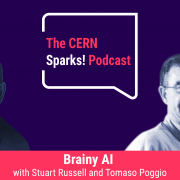Do we need to understand the brain to make progress in artificial intelligence? In the first podcast in the series, Stuart Russell and Tomaso Poggio contrast “deep learning” with our own organic neural networks. In an age of great demonstrations by the likes of Deep Mind and OpenAI, our guests make the case for focusing on controlled experimentation, and question the wisdom of using AI in science before it is fully understood. The mystery of intelligence, says Poggio, is the greatest problem in science today — if we solve it, we solve all other problems too.
For more on "The CERN Sparks! Podcast - Future Intelligence" episodes — Can artificial intelligence be curious? Can it be creative? Can we create it to be ethical and push past the limits that exist today to imagine a world made better with AI in it? At CERN, machine learning already plays a pivotal role in the quest for advancing human knowledge through particle physics – from detector design to data acquisition and analysis. But can AI one day take over the role of scientists? Join hosts Abha and Mark on the Sparks! podcast as they journey through a series of conversations with leading minds shaping the realm of Future Intelligence.
CERN Sparks podcasts explore artificial intelligence
The series collides pairs of leading experts on AI to preview the Sparks! Serendipity Forum in September
By Mark Rayner
On Tuesday, CERN will launch a new podcast series on artificial intelligence. The series looks forward to the first edition of the Sparks! Serendipity Forum in September, when over 30 leading thinkers will converge on the laboratory for high-level multidisciplinary discussions designed to spark ethical innovation.
To whet your appetite for the forum, the podcasts bring a selection of the Sparks delegates together in pairs. Think of these conversations like collisions in the LHC. Rather than protons, however, we’re colliding a diverse cast of thought leaders featuring computer scientists, neuroscientists, philosophers, physicists and psychologists. And rather than energy being transformed into new particles, the weight of scholarship is transformed into new seams of creative energy — a foretaste of the intellectual dust-up planned for September...

